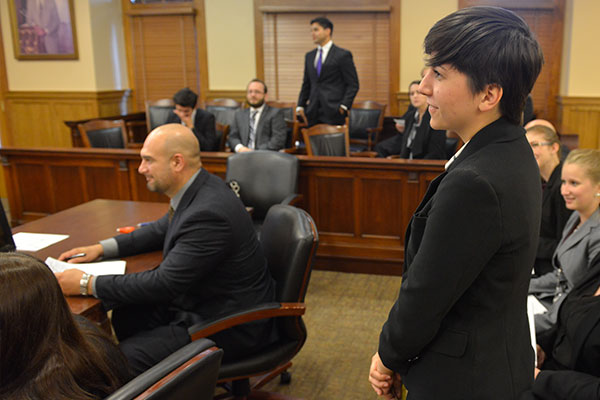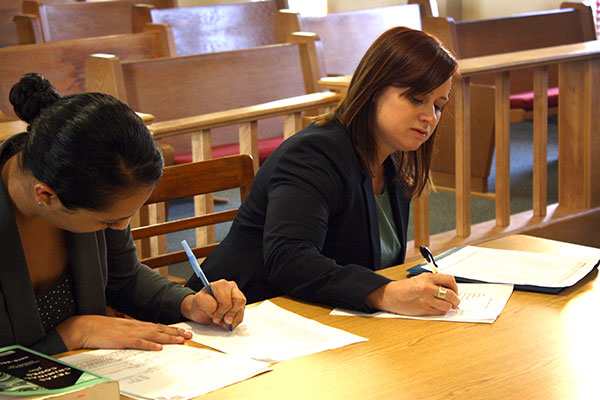Clinical Program
Resources for the Community
The Consumer Protection Clinic has a Housing Hotline at 210-570-6135 that offers free legal information, advice, and referrals for people under threat of eviction or foreclosure.
The number for Texas Rio Grande Legal Aid is 888-988-9996. If you need relocation, mortgage or tax assistance in the City of San Antonio, call 210-207-5910.
About the Clinical Program
St. Mary’s University School of Law proudly offers six outstanding clinical courses for second- and third-year law students: Consumer Protection, Criminal Justice, Family Law, Immigration and Human Rights, Microenterprise and Community Development, and Real Estate.
The clinical courses are dedicated to educating students at St. Mary’s while addressing the otherwise unmet legal needs of income-qualified people in San Antonio and South Texas.
Being a Student Attorney
Student attorneys gain practical, hands-on experience in all aspects of case-handling in each of the clinical courses under the direct supervision of a member of the faculty.
They interview and counsel clients, investigate facts to obtain and organize evidence, draft legal documents, negotiate with opposing counsel and administrative agencies and try actual cases in district, county and administrative courts.
Serving the Community
Student attorneys enjoy hands-on advocacy and guide their clients through the legal system by keeping them updated on their cases, explaining the applicable law, preparing them for trial and representing them in different forums. The Clinical Program gives student attorneys a direct opportunity to use their skills to aid individuals in critical need.
Through their clinical work, students at St. Mary’s provide significant service to the community by augmenting the legal resources available to serve the people in San Antonio and South Texas.
The Commitment Required
The clinical work at St. Mary’s consists of a classroom component and a casework component. The classroom segment includes lectures, discussions, group exercises and simulations. In the classroom, student attorneys learn the substantive law and lawyering skills necessary for the effective and ethical handling of cases.
For their individual cases, student attorneys must commit to regular office hours and legal outreach, in addition to their classroom time. Each clinic is one semester long and six credit hours.* Second semester options are sometimes available for three credits.
*Clinical courses offered to students in the Online Program at regular intervals and are often for less than six credits.
Our Clinics
Consumer Protection Clinic
The consumer protection practice area focuses on economic justice for low-income tenants: specifically, community members at risk of, and/or subject to, eviction.
Student attorneys enrolled in the Consumer Protection Clinic carry out the work of the Housing Rights Project. Under attorney supervision, student attorneys staff the Clinic’s Housing Hotline, which provides information, brief advice, and referrals in collaboration with area legal services providers.

Student attorneys also represent tenants facing eviction in the justice court, as well as in appeals to the County Courts at Law. Under supervision, student attorneys provide advice and counsel, negotiation and litigation services to our clients.
Student attorneys engage in community outreach and legal empowerment events. Recent examples of these public education efforts include the development of self-help materials shared in-person and online, volunteering with Texas RioGrande Legal Aid’s Appeals Desk project, attending community resource fairs and delivering presentations to community members interested in landlord-tenant law.
Prerequisites: None
Recommended Courses: None
Faculty: Clinical Assistant Professor Greg Zlotnick
Criminal Justice Clinic

The Criminal Justice Clinic provides students who enroll in the for-credit course with the opportunity to gain substantive knowledge and practical skills by representing income-qualified clients — juveniles and adults — who are charged with criminal offenses ranging from misdemeanors to capital offenses.
Some of the types of cases students handle include:
- driving while intoxicated
- theft
- assault
- possession of controlled substances
- trespassing
Students represent individuals in jury trials, contested motions and plea negotiations. Students also participate in appellate brief writing and oral arguments before the Fourth Court of Appeals, the Texas Court of Criminal Appeals and even the Fifth Circuit Court of Appeals in New Orleans. Within the Criminal Justice Clinic, students have an opportunity to challenge wrongful convictions through the writ of habeas corpus process.
The clinic experience includes weekly classes on Texas criminal procedure, the rules of evidence and professional responsibility, as well as practical advice. Students are required to participate in weekly courtroom simulations to prepare for trial. For example, students will prepare and deliver opening statements and closing arguments and cross-examine witnesses in a mock setting to learn and improve advocacy skills.
Prerequisites: None
Recommended Courses: Evidence
Faculty: Clinical Professor of Law Stephanie Stevens and Visiting Clinical Assistant Professor Aaron Diaz
Family Law Clinic
In the family law practice area, student attorneys represent clients in state court with simple divorces (no children, no property), adoptions and name changes. Student attorneys also serve, by court appointment only, as Amicus Attorneys in Title IV-D courts. Students in the Family Law practice area will also draft simple wills and ancillary documents as well as represent clients with probate matters before the Bexar County Probate Courts.
Prerequisites: None
Recommended Courses: Family Law; Texas Civil Procedure; Wills and Estates; Evidence
Faculty: Clinical Professor of Law Dayla S. Pepi
Immigration and Human Rights Clinic
The Immigration and Human Rights Clinic introduces students to the practice of law through the supervised representation of income-qualified immigrants and refugees in matters before Immigration Courts, the Board of Immigration Appeals and the Department of Homeland Security (DHS).
Students in this course will learn to:
- interview and counsel clients
- develop case strategy
- prepare applications
- gather and organize evidence
- draft motions and briefs
- appear on behalf of their clients before the agency and courts

The clinic caseload includes a variety of immigration and nationality issues, including the defense of immigrants in removal proceedings, applications for asylum, adjustment of status, claims to U.S. citizenship and benefits available to crime victims.
The classroom component of the Immigration and Human Rights Clinic course includes a practice-oriented examination of complex immigration law and specially tailored exercises and simulations designed to instill the basics of good legal practice.
Prerequisites: None
Recommended Courses: Immigration Law; Immigration Court Practice
Faculty: Clinical Professor of Law Erica Schommer
Microenterprise and Community Development Clinic
The Microenterprise and Community Development Clinic is a transactional practice giving students the opportunity to provide transactional legal assistance to micro-businesses and community-based nonprofits. Student attorneys in this Clinic will assist clients to form entities, draft contracts, navigate compliance, and strengthen governance.
Prerequisites: None
Recommended Courses: Business Associations; Contract Drafting
Faculty: Clinical Assistant Professor of Law Andrea Beleno Harrington
Real Estate Clinic
The Real Estate Clinic is a transactional practice focused on preserving homeownership. Student attorneys draft real estate documents, negotiate heirship disputes and plan estates, enabling low-income homeowners to remove clouds on title, access repair assistance programs, and protect property wealth for future generations. Student attorneys also advise on property tax matters and foreclosure prevention. The clinic works with community partners, including the Mexican American Unity Council and Texas RioGrande Legal Aid, to identify potential clients and educate the community about homeownership protections.
The classroom component of the Real Estate Clinic covers topics such as real estate drafting, title examination, probate avoidance strategies, client interviewing and counseling and transactional ethics and professionalism. The Real Estate Clinic is an excellent choice for students interested in real estate, transactional law or affordable housing.
Prerequisites: None
Recommended Courses: Wills and Estates; Mortgages
Faculty: Clinical Professor of Law Genevieve Hébert Fajardo